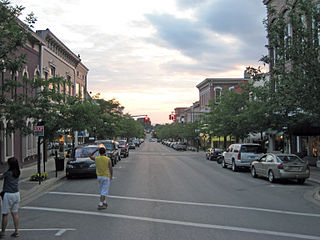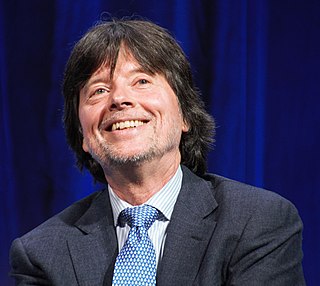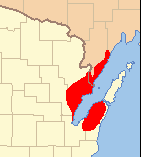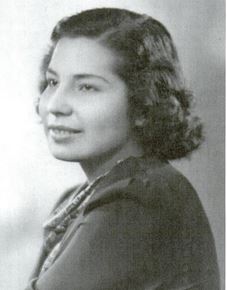Related Research Articles

Emmet County is a county located in the U.S. state of Michigan. It is the northernmost county in the Lower Peninsula. As of the 2020 census, the population was 34,112, making it the second-most populous county in Northern Michigan. The county seat is Petoskey, which is also the county's largest city.

Petoskey is the largest city and the county seat of Emmet County, Michigan, and is the largest settlement within the county. Petoskey has a population of 5,877 at the 2020 census, up from 5,670 at the 2010 census.

Kenneth Lauren Burns is an American filmmaker known for his documentary films and television series, many of which chronicle American history and culture. His work is often produced in association with WETA-TV or the National Endowment for the Humanities and distributed by PBS.

The Peshtigo fire was a large forest fire on October 8, 1871, in northeastern Wisconsin, United States, including much of the southern half of the Door Peninsula and adjacent parts of the Upper Peninsula of Michigan. The largest community in the affected area was Peshtigo, Wisconsin, which had a population of approximately 1,700 residents. The fire burned about 1.2 million acres and is the deadliest wildfire in recorded history, with the number of deaths estimated between 1,500 and 2,500. Although the exact number of deaths is debated, mass graves, both those already exhumed and those still being discovered, in Peshtigo and the surrounding areas show that the death toll of the blaze was most likely greater than the 1889 Johnstown flood death toll of 2,200 people or more.

DevilDriver is an American heavy metal band from Santa Barbara, California, formed in 2002, consisting of vocalist Dez Fafara, bassist Jon Miller, rhythm guitarist Alex Lee and drummer Davier Pérez. The band was originally named Deathride, however, due to copyright issues and the name being taken by several bands, the band changed its name to DevilDriver.

USCGC Mesquite (WAGL/WLB-305) was the lead ship in the Mesquite class of seagoing buoy tenders operated by the United States Coast Guard. She served in the Pacific during World War II, and spent the rest of her Coast Guard career in the Great Lakes. She ran aground and was wrecked in December 1989 off the Keweenaw Peninsula in Lake Superior. She was scuttled nearby as a recreational diving attraction.

Northern Michigan, also known as Northern Lower Michigan, is a region of the U.S. state of Michigan. A popular tourist destination, it is home to several small- to medium-sized cities, extensive state and national forests, lakes and rivers, and a large portion of Great Lakes shoreline. The region has a significant seasonal population much like other regions that depend on tourism as their main industry. Northern Lower Michigan is distinct from the more northerly Upper Peninsula and Isle Royale, which are also located in "northern" Michigan. In the northernmost 21 counties in the Lower Peninsula of Michigan, the total population of the region is 506,658 people.
Keith Famie is an American chef-restaurateur and film director and producer. He notoriously appeared in Survivor: The Australian Outback (2001), finishing in third place.

Wendy Froud is an American doll-artist, sculptor, puppet-maker, and writer. She is best known for her work fabricating Yoda for the 1980 film Star Wars: The Empire Strikes Back, for which she has been called "the mother of Yoda", and creatures for the Jim Henson films The Dark Crystal and Labyrinth.

Frederick Lee "Ted" Petoskey was a three-sport athlete at the University of Michigan, a Major League Baseball player, a collegiate coach in three sports and an athletic director.

Ronit Avni is a Canadian entrepreneur, tech founder, human rights advocate, and Peabody Award-winning film director and producer.

Jeanne Theoharis is a Distinguished Professor of Political Science at Brooklyn College.

Valarie Kaur is an American activist, documentary filmmaker, lawyer, educator, and faith leader. She is the founder of the Revolutionary Love Project. Kaur's debut book, See No Stranger: A Memoir and Manifesto of Revolutionary Love, was published in June 2020. The book expands upon Kaur's TED Talk.

Rose Kennedy Schlossberg is an American filmmaker and artist specializing in video installations. She co-produced and co-wrote the Peabody Award-winning documentary series Time: The Kalief Browder Story (2017), created the apocalyptic installation art and web series End Times Girls Club, and has also directed music videos and short films.
Andrea Geyer is a German and American multi-disciplinary artist who lives and works in New York City. With a particular focus on those who identify or at some point were identified as women, her works use photography, performance, video, drawing and painting to activate the lingering potential of specific events, sites, or biographies. Geyer focus on the themes of gender, class, national identity and how they are constantly negotiated and reinterpreted against a frequent backdrop of cultural meanings and memories. Geyer has exhibited at institutions such as the San Francisco Museum of Modern Art (SFMOMA), MOMA, and The Whitney Museum.

Waunetta McClellan Dominic was an Odawa rights activist who spent her career advocating for the United States government to adhere to its treaty obligations to Native Americans. She was one of the founders of the Northern Michigan Ottawa Association and her influence was widely recognized, especially after winning a 1971 claim against the government for compensation under 19th-century treaties. She was also a proponent of Native American fishing rights being protected. In 1979, she was named by The Detroit News as "Michiganian of the Year" and in 1996, she was posthumously inducted into the Michigan Women's Hall of Fame.
Our Fires Still Burn is a one-hour documentary produced by Audrey Geyer that explores the experiences of contemporary Native Americans through a compilation of first-person narratives ranging from midwestern Native Americans in "Indian boarding schools" where children were forced for assimilation. The documentary depicts the personal stories of Native American role models from all walks of life, including a successful businessman, journalist, artist, and youth advocate, as well as tribal and spiritual leaders. The documentary still continues to be run by the Public Broadcast System (PBS).
Yvonne Walker Keshick is an Anishinaabe quillwork artist and basket maker.
Lisa Rinzler is an American cinematographer who works on both feature films and documentaries. She has worked with Wim Wenders, Martin Scorsese, the Hughes Brothers and Tamra Davis.
Angelo Madsen Minax is an American filmmaker and interdisciplinary artist.
References
- ↑ "About Audrey". www.ourfiresstillburn.com. Retrieved December 29, 2018.
- 1 2 "Native Concerns in Focus". U-M College of LSA. Retrieved December 29, 2018.
- 1 2 3 "AUDREY GEYER, MSW '94". NYU School of Social Services.
- ↑ Stateside Staff (June 22, 2016). "Documentary follows Native Americans fighting to keep their culture and traditions alive". Michigan Radio. Retrieved December 29, 2018.
- ↑ Feinberg, Robbie (November 20, 2015). "Michigan Filmmaker Brings Native American Stories—Not Stereotypes—Into Documentary". www.wmuk.org. Retrieved December 29, 2018.
- ↑ www.visionmakermedia.org https://www.visionmakermedia.org/sites/default/files/7-15-14_FNL_2014PMCFundAwards.pdf . Retrieved December 29, 2018.
{{cite web}}: Missing or empty|title=(help) - ↑ "Our Fire Still Burns Screens Tonight In Windy City". November 12, 2013.
- ↑ "Our Fires Still Burn: The Native American Experience". The Howell Opera House. Retrieved December 29, 2018.
- ↑ "Our Fires Still Burn hosted by Audrey Geyer". News and Events. October 28, 2016. Retrieved December 29, 2018.
- ↑ Doerr, Mary Jane. "Our Fires Still Burn: Petoskey namesake produces music for documentary". Petoskey News-Review. Retrieved December 29, 2018.
- ↑ "Lansing lawyer keeps 'Anatomy' in spotlight". Flint-Genesee County Legal News. Retrieved December 29, 2018.